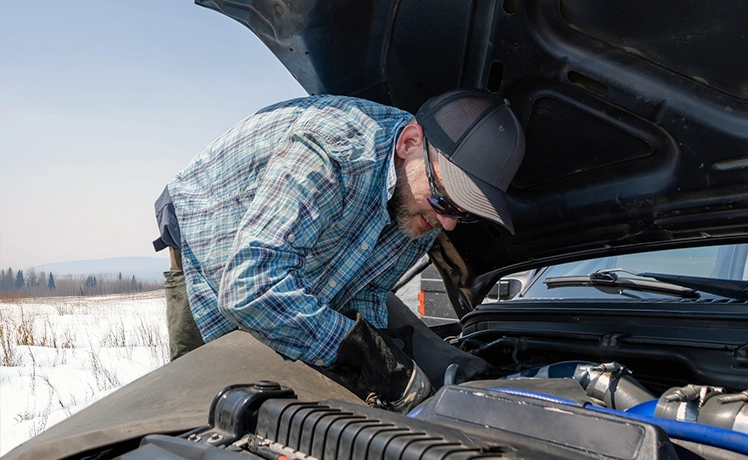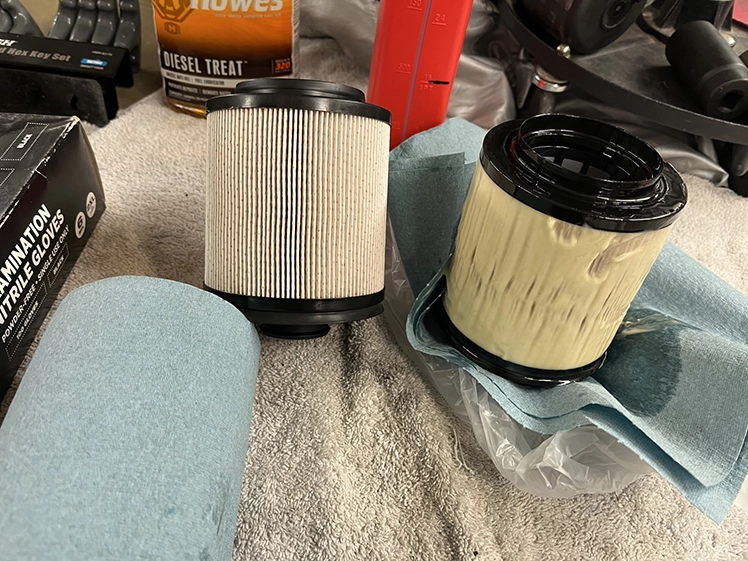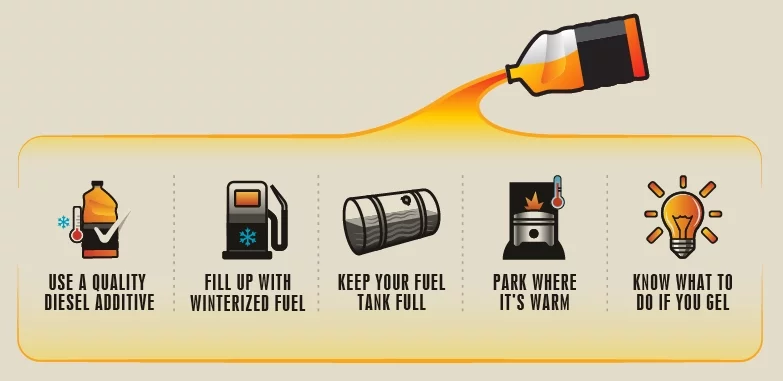
02/28/25
Diesel Treat, Diesel Lifeline, Gelling, Light Duty
By Rich Guida
Diesel pickup trucks are workhorses built for power, towing, and durability. However, they also have a well-known Achilles’ heel—cold weather. When temperatures drop, diesel fuel can begin to gel, causing serious problems for your truck’s performance. Unlike gasoline engines, diesel engines rely on fuel with a higher wax content, which can solidify in extreme cold. This problem is even more pronounced in diesel pickups due to the positioning of their fuel lines and lack of insulation, making them especially vulnerable to fuel gelling.
If you own a diesel pickup truck such as a Ford Powerstroke Diesel, Dodge Cummins Diesel, or GMC/Chevrolet Duramax Diesel, understanding the risks of diesel fuel gelling and how to prevent it can save you from headaches on frigid winter mornings.

Diesel fuel gelling occurs when the paraffin wax in diesel solidifies due to low temperatures. As the solidified wax binds together, it begins to restrict fuel flow through the filters. While any diesel-run engine faces the potential of gelling in cold weather, diesel pickups are more prone to it for several reasons:
1. Exposed Fuel Lines — Unlike larger heavy-duty trucks, which often have well-protected fuel systems, the fuel lines in many diesel pickups are more exposed to the elements. This makes them more susceptible to the cold, especially when parked outside overnight.
2. Smaller Fuel Tanks — Diesel pickups have smaller fuel tanks than semi-trucks, which allows the fuel to cool more rapidly. As soon as the fuel in the tank drops to its cloud point (the temperature at which wax crystals begin to form), gelling can start quickly.
3. Limited Insulation — Heavy-duty trucks often have additional insulation around fuel lines and tanks, but diesel pickup trucks typically do not. This leaves them more exposed to temperature drops, especially in extreme weather conditions.
4. Engine Block Heaters Don't Help the Fuel Lines — Many diesel pickup owners rely on engine block heaters to keep their trucks warm. While block heaters help the engine start, they do nothing to keep fuel from gelling in the tank or fuel lines. Even with a block heater plugged in, a gelled fuel line can still prevent your truck from running.

Preventing diesel fuel gelling is crucial to keeping your pickup running smoothly during winter. Here are the best steps to take:
1. Use a High-Quality Diesel Fuel Additive
The best way to prevent gelling is to treat your fuel with a premium anti-gel additive like Howes Diesel Treat. This additive lowers diesel's pour point, preventing wax crystals from forming and keeping your fuel flowing even in extreme temperatures.
2. Fill Up with Winterized Diesel
Many fuel stations offer winter blend diesel during colder months, which may include diesel additives to lower the fuel's cloud point. However, these blends are unpredictable and may not always be enough to prevent gelling in extreme cold. This makes using an additional fuel additive like Howes Diesel Treat essential.
3. Keep Your Fuel Tank Full
A fuller tank reduces the chances of condensation forming inside. Condensation can lead to water contamination and further fuel system issues. Water in your fuel can contribute to icing and gelling problems and should be avoided as much as possible.
4. Park in a Heated Garage or Use a Tank Heater
If possible, park your truck in a garage or use a diesel fuel tank heater to help keep fuel from reaching dangerously low temperatures overnight. But beware, fuel in the lines can still gel even when using a tank heater. If the vehicle is outside with prolonged exposure to the cold, the heat from the tank heater may not be enough to keep fuel lines warm. Distance causes the same issues experienced with an engine block heater.
5. Know What to Do If Your Diesel Fuel Gels Up
Despite taking precautions, severe cold can still cause unexpected gelling. If your truck won't start and you suspect fuel gelling, you need a diesel emergency fuel rescue product like Howes Diesel Lifeline. Unlike some treatments that require warm fuel for the product to work, Diesel Lifeline is designed to quickly reliquefy gelled fuel and de-ice frozen fuel filters to get your truck running again without needing pre-mixing, filter changing, or calling a tow.
If you drive a diesel vehicle, winter prep is a must. If you drive a diesel pickup truck, it's even more important! Cold temperatures can quickly turn your reliable pickup into a frozen hunk of metal if you don't take proper measures.
By consistently using a high-quality anti-gel diesel fuel additive like Howes Diesel Treat and keeping Howes Diesel Lifeline on hand for emergencies, you can ensure that your truck stays running no matter how cold it gets.
Don't wait until your diesel gels up - take action now and drive with confidence for the rest of the winter and every winter to come.
